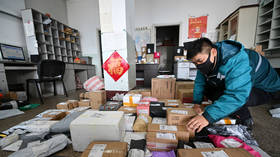Canada responds to claim Covid arrived in China via ‘overseas deliveries’

Canada’s health officials have cast doubt on Beijing’s claim that the first reported Omicron case in China could have been caused by a person interacting with a contaminated mail from Toronto, saying that is “highly improbable.”
“I find this to be, let’s say, an extraordinary view,” Canada’s Health Minister Jean-Yves Duclos told a news conference Monday. The minister swiftly responded to an allegation earlier voiced by Chinese health specialists.
Beijing’s Center for Disease Control and Prevention had said it “cannot be ruled out” that a mail delivery containing a batch of documents had become the source of the disease in the case that saw one person diagnosed with the Omicron infection – the first such case in Beijing.
The person, whose diagnosis was confirmed on Saturday, received mail from Canada that was then found to have the Omicron strain present on its outer and inner package surfaces as well as on the documents themselves, the Chinese media reported. The strain in this case was also “similar” to the one found in North America and Singapore in December 2021, Chinese officials said.
The news was met with skepticism in Canada. Dr. Supriya Sharma, the chief medical adviser at Health Canada, described this “overseas deliveries” hypothesis as “highly improbable.”
“You would have to have virus on an object, it would have to survive through all of that transport and all of those circumstances,” she told the Canadian media, adding that “it would be highly unlikely that that could ever transmit COVID-19.”
Earlier, Chinese virologist Yang Zhanqiu said that the virus could survive several days even at room temperature and much longer at lower temperatures. Canada’s health officials didn’t appear to be convinced by China’s arguments, though.
“While mail may be contaminated, the risk of COVID-19 infection when handling paper mail or cardboard packages, including international mail, is extremely low,” Canada’s Public Health Agency said in a statement.
A host of Canadian experts questioned by the nation’s media rushed to dispute the Chinese claims. Some of them were also quick to assume politics might be the driving factor behind China’s statements. “Sino-Canadian relations are in poor shape, and China may be very keen to counter accusations that it infected the world, with these sorts of narratives,” Dr. Colin Furness, an expert in infectious disease epidemiology from the University of Toronto, told CTV News.
Beijing has not responded to Ottawa’s doubts so far.













